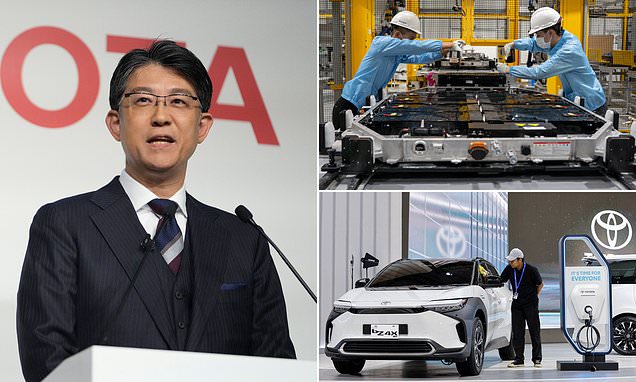Toyota has said it is close to being able to mass manufacture potentially revolutionary solid-state batteries that could offer double the range of existing electric cars.
According to Toyota, cars powered by solid-state batteries could have a range of 745 miles, a charging time of 10 minutes and hit the market in 2027 or 2028.
They have been presented by experts as a revolutionary technology that could bring EVs into the mainstream.
Switching to an electric vehicle is out of reach for many Americans, experts have warned, as a lack of access to charging ports mean they fear being left stranded in shorter-range vehicles.
The driving range of electric cars varies between models, but is typically around 300 miles.
While solid-state batteries could be revolutionary, they also present challenges for manufacturers. According to Toyota, one of the most significant hurdles is the assembly process, in which layers of cathode and anode cells need to be stacked quickly and precisely.
Claims that Toyota is on the brink of being of being able to mass manufacture solid-state batteries were first published in the Financial Times on Monday.
'In terms of the stacking speed, we are almost there. We are going to roll out bigger volumes and check the quality,' an engineer for the company told the outlet.
Earlier this month, Toyota CEO Koji Sato announced that the firm would partner with major Japanese oil refiner Idemitsu Kosan on the project to manufacture the batteries.
'With repeated efforts involving trial and error, we have succeeded in developing a material that is more stable and less prone to crack,' Sato told reporters in Tokyo during an announcement with Idemitsu.
'The future of mobility lies in the tie-up between the auto and energy sectors, including this innovation hailing from Japan,' he said.

 www.dailymail.co.uk
www.dailymail.co.uk
According to Toyota, cars powered by solid-state batteries could have a range of 745 miles, a charging time of 10 minutes and hit the market in 2027 or 2028.
They have been presented by experts as a revolutionary technology that could bring EVs into the mainstream.
Switching to an electric vehicle is out of reach for many Americans, experts have warned, as a lack of access to charging ports mean they fear being left stranded in shorter-range vehicles.
The driving range of electric cars varies between models, but is typically around 300 miles.
While solid-state batteries could be revolutionary, they also present challenges for manufacturers. According to Toyota, one of the most significant hurdles is the assembly process, in which layers of cathode and anode cells need to be stacked quickly and precisely.
Claims that Toyota is on the brink of being of being able to mass manufacture solid-state batteries were first published in the Financial Times on Monday.
'In terms of the stacking speed, we are almost there. We are going to roll out bigger volumes and check the quality,' an engineer for the company told the outlet.
Earlier this month, Toyota CEO Koji Sato announced that the firm would partner with major Japanese oil refiner Idemitsu Kosan on the project to manufacture the batteries.
'With repeated efforts involving trial and error, we have succeeded in developing a material that is more stable and less prone to crack,' Sato told reporters in Tokyo during an announcement with Idemitsu.
'The future of mobility lies in the tie-up between the auto and energy sectors, including this innovation hailing from Japan,' he said.

Toyota battery breakthrough enables range of 745 miles
Toyota has said it 'close' to being able to mass manufacture potentially revolutionary solid-state batteries that could offer double the range of existing electric cars.













